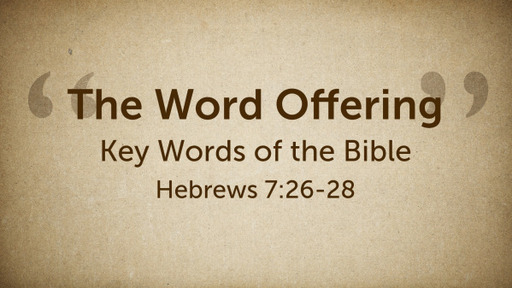The Word Offering

In the Old Testament, we see offerings that were offered daily for sin. Today, we have a permanent offering through the atoning death of Christ on the Cross.
Introduction
1sac•ri•fice \ˈsa-krə-ˌfīs, also -fəs or -ˌfīz\ noun
[Middle English, from Anglo-French, from Latin sacrificium, from sacr-, sacer + facere to make—more at DO] 13th century
1: an act of offering to a deity something precious especially: the killing of a victim on an altar
2: something offered in sacrifice
3 a: destruction or surrender of something for the sake of something else
b: something given up or lost 〈the sacrifices made by parents〉
4: LOSS 〈goods sold at a sacrifice〉
5: SACRIFICE HIT
of•fer•ing \ˈȯ-f(ə-)riŋ, ˈä-\ noun
before 12th century
1 a: the act of one who offers
b: something offered especially: a sacrifice ceremonially offered as a part of worship
c: a contribution to the support of a church
2: something offered for sale or patronage 〈latest offerings of the leading novelists〉
3: a course of instruction or study
Declaration
1. Christ: Separate from Sinners
A. Christ was a Personal Sacrifice v. 26
B. Christ was a Perfect Sacrifice v. 26
C. Christ was a Powerful Sacrifice v. 27
Satisfaction or expiation does not awaken love in the divine mind. It only renders it consistent with His justice that God should exercise His love towards transgressors of His law” (Charles Hodge).
The difference between propitiation and expiation is not always easy to understand, even though we all experience it.
Consider the case of a certain factory worker who was seriously injured on the job. After the doctors had done all they could, he was still left partially paralyzed. An investigation revealed that the company was at fault because it did not provide a safe work place nor the proper safety equipment for its employees. Thus, it was liable for the dangerous conditions that resulted in this man’s injury and permanent paralysis.
As we all have seen in similar situations, the court will probably award the injured man a great sum of money for his pain, suffering, and permanent injury. Once the company pays the judgment against it, it has expiated its wrongdoings. The demands of justice have been satisfied. The company no longer has any responsibility toward the injured man. That is expiation.
But we have not dealt with how the injured man feels toward the company. He may be filled with resentment, bitterness, even hatred. He may spend the rest of his life abhorring the name of that company, even though it has been directed to give him all the money he could possibly use. The debt that the wrong incurred has been expiated or paid for, but the wrath that the wrong incurred has not been propitiated.
When Christ died, he not only paid the debt for our sins but reconciled us to God by satisfying the Father’s wrath. He was both an expiation and a propitiation for our sins.1106
2. Christ: Sacrificed for Sinners
A. Sacrifice requires something’s death v. 27 “for this”
B. Sacrifice requires sufficient death v. 27 “he did once”
C. Sacrifice requires surrendered death v. 27 “when he offered up himself”
3. Christ: Sufficient for Salvation
A. Christ’s Sacrifice is made because of our sin v. 28
B. Christ’s Sacrifice is why He came to earth v. 28
C. Christ’s Sacrifice is made forever by the oath v. 28
Conclusion
The supreme question, in regard to any sacrifice, is this—Is it acceptable to God? Will He make it a basis on which to accept us? If it is acceptable to Him, if He does accept us on the ground of it, what more has to be said? Who has any right to complain? On what ground can any other sacrifice be asked for? And that is precisely what we claim to be the fact concerning the sublime self-sacrifice of the Lord Jesus Christ, concerning the offering of Himself. God is infinitely satisfied with it: He is willing to accept us on the ground of it.
